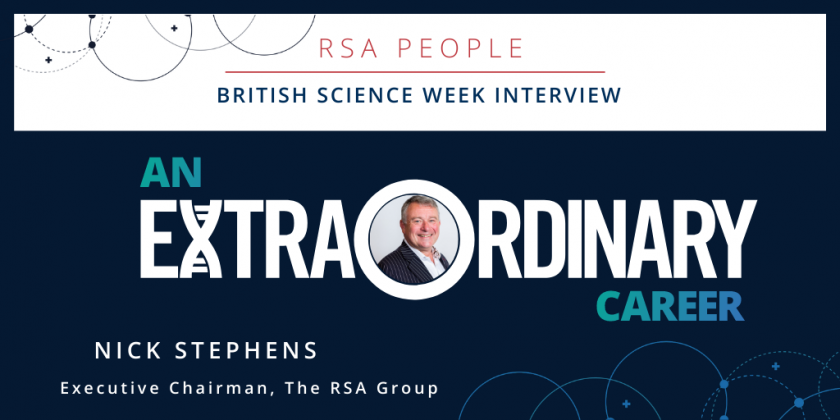RSA People | British Science Week interview with Nick Stephens
By Nick Stephens
Today’s feature for British Science Week is our Executive Chairman, Nick Stephens. In this interview, Nick describes the experiences that led him to where he is now; diving into the influences he has had throughout his extraordinary career and the changes he hopes to see in the future.
What early influences do you feel led you to a career in Lifesciences?
My father worked for Roche and My mother was a biologist. I was brought up before the internet existed; you had to go to the library or read at home to learn anything. We had bookshelves full of interesting books and I was a voracious reader. Being in the garden with mum was like the internet of Biology! We could go anywhere, and she would answer all my questions.
I studied science at A-Level because of those early influences. I would have loved to have gone into marine biology; I am still an active diver to this day so marine biology is where my heart is. At the time I had other goals which led me to study law. I did some metals trading before moving to the healthcare sector. After seven years, I joined my father at (what is now) RSA. Five years later I “took over” and I could not be more thankful for that opportunity. Science and understanding how the world works have always fascinated me and I have loved my 27 years in this industry. Why? Because I spend my life talking to people who are more intelligent than me about things that fascinate me. I learn every day from the most inspirational people – people like my mother and father – and if I do my job well, more people stay / get well.
Who are some of the most inspiring people you have worked with? How have they helped to shape your thoughts?
There have been so many but if I must pick just two …
I have known and worked with Mehmood Khan for many years. I will always remember when he moved to Pepsico, which came as a surprise as he was an endocrinologist and president of R&D for Takeda. after his seventh year in the position, I gave him a call. He had “run the numbers” and told me that he had saved more lives in his Pepsi role than in all his previous medical and pharmaceutical career. He has taught me the true “power of executive influence” and inspires me to exert my own influence to maximum effect, for clients, candidates, and for the patients we all serve.
John Wong, a medical oncologist by training (and still practicing) and one of the key figures behind Singapore’s biomedical transformation has become a good friend. He works tirelessly for the benefit of patients, bringing together all aspects of science, medicine, and even urban design to support the health of patients in Singapore and across the world. He has taught me that when you combine the right goal with the right people you can achieve things that looked impossible when you started out.
Translating the lessons of my mentors to RSA has been distilled into one key purpose, ensuring that the people we find are engaged, energised, and inspired by the mission of our clients.
What changes have you seen in British Science over the 40 years RSA has been advising leaders? Which do you feel have had the most influential impacts?
The big picture is this: We are seeing a convergence of three major elements:
- A greater understanding of basic biology. RSA helped to build the leadership team for the Human Genome Project who decoded the human genome and gave it to the world for free. The full process took 10 years, but to have a hand in this massive achievement is amazing.
- AlphaFold is a prime example of how far Artificial intelligence has come. It was able to perform the equivalent of thousands of years’ worth of human effort into protein research in just one night. Even general-purpose products are becoming an increasingly interesting field.
- The exponential increase in data processing power. Has made the first two tractable and actionable.
Wrapping our heads around the intricacies of science will never end, no matter how far into the future we go, but every day we can get a little bit closer to solving life’s mysteries. Seeing our industry’s acceleration is one of the most exciting things about living in today’s world. Truth be told, it is just cool that we have been able to experience all these advancements.
What changes would you like to see in the next 40 years?
I genuinely believe, that at the end of it all, longevity is the goal. Extending healthy human lifespan is becoming a tractable task now. I know the leaders at the forefront of this field and the future is certainly bright. Of course, longevity will bring problems for society and the planet. We will need to find better ways to care for our home and we need to ensure equal access to longevity technologies in order to build a stable society. Once we achieve that, illness and death may simply become “engineering problems”.
If you would like to talk to Nick about any of the topics he has raised, you can contact him at Nick.Stephens@theRSAgroup.com.